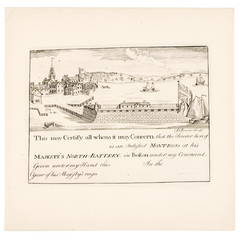“The honest fervour which distinguished the friends of liberty in 1775”
I want to complete the life story of Nathaniel Barber, captain of Boston’s North Battery in the years leading up to the war.
I discussed how Gov. Thomas Hutchinson gave him that militia assignment, which came with the title of major, back here. And also how that favor from the royal governor didn’t stop Barber’s political activity against the royal government.
During the war, Barber remained on Boston’s committee of correspondence. He also served as muster master for Suffolk County. In 1782 the Massachusetts General Court chose Barber to be the state navy’s agent in Boston.
In addition, Barber’s son Nathaniel, Jr., became a commissary of stores for the eastern department of the Continental Army from April 1776 to April 1781. The two men are sometimes amalgamated, but the father was supplying the navy, the son the army.
Barber held the naval title from 1782 to 1785. Then the legislature chose James Lovell. He did the job for two years before becoming collector of impost and excise for Suffolk County, which sounds more lucrative. At that point, in July 1787, the legislature hired Barber again.
But Barber didn’t last long in the job. He died in October 1787 at the age of fifty-nine. His remains were placed in the family tomb at Copp’s Hill Burying Ground. The Massachusetts Gazette called him: “An honest man, and a firm patriot.” The American Herald said he was “a staunch, sincere friend to his country, and an upright, honest citizen.”
And the Massachusetts Centinel for 20 Oct 1787 stated:
I discussed how Gov. Thomas Hutchinson gave him that militia assignment, which came with the title of major, back here. And also how that favor from the royal governor didn’t stop Barber’s political activity against the royal government.
During the war, Barber remained on Boston’s committee of correspondence. He also served as muster master for Suffolk County. In 1782 the Massachusetts General Court chose Barber to be the state navy’s agent in Boston.
In addition, Barber’s son Nathaniel, Jr., became a commissary of stores for the eastern department of the Continental Army from April 1776 to April 1781. The two men are sometimes amalgamated, but the father was supplying the navy, the son the army.
Barber held the naval title from 1782 to 1785. Then the legislature chose James Lovell. He did the job for two years before becoming collector of impost and excise for Suffolk County, which sounds more lucrative. At that point, in July 1787, the legislature hired Barber again.
But Barber didn’t last long in the job. He died in October 1787 at the age of fifty-nine. His remains were placed in the family tomb at Copp’s Hill Burying Ground. The Massachusetts Gazette called him: “An honest man, and a firm patriot.” The American Herald said he was “a staunch, sincere friend to his country, and an upright, honest citizen.”
And the Massachusetts Centinel for 20 Oct 1787 stated:
On the 13th instant died, very suddenly, in the fifty-ninth year of his age, and on Thursday last were respectfully deposited in the tomb of his ancestors, attended by the Honourable Members of the Senate and House of Representatives, and many of his fellow townsmen, the remains of NATHANIEL BARBER, Esq. Naval-Officer for the port of Boston.—
A numerous family mourn their loss—the publick regret their being deprived of a faithful and approved servant—and the friends of liberty could not but drop a tear over the grave of so known and tried a patriot—
His attention and integrity in the cause of his country, expressed in the most dangerous and trying moments, more especially as one of the committee of correspondence, of which he was always a member, marked his character—and it may be justly said, that the honest fervour which distinguished the friends of liberty in 1775, was retained by Col. Barber in its full warmth to the moment of his death.


No comments:
Post a Comment